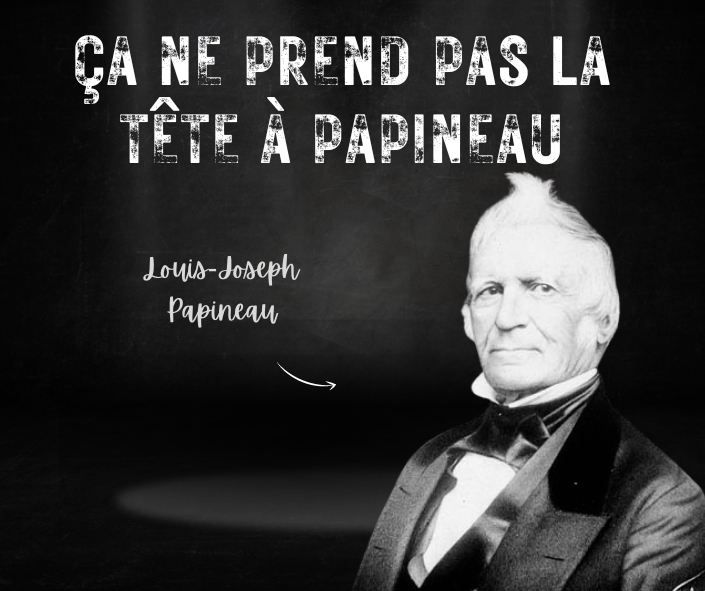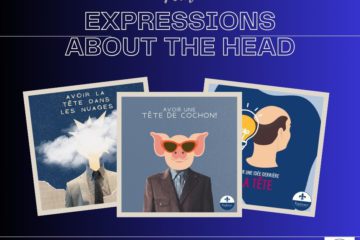4 Expressions in French From Quebec
Challenge #4

If you know me, you know that my language, French, is much more than words and verbs to me: it’s a real passion and even a conviction sometimes. It’s all undoubtedly due to the fact that Quebec French is today an island in a North American ocean of English. But for those who don’t know it, when Europeans first arrived in North America, the French territory was much larger and more vast than the English territory of Britain. From north to south, the Nouvelle-France stretched from Quebec to present-day Louisiana, while from east to west, the territory extended from the Atlantic Ocean to present-day Saskatchewan (Canada), and as far south as present-day Missouri.
What Characterizes Quebec Expressions?
It comes as no surprise, then, that Quebec French has many expressions that exist nowhere else, and which are directly linked to our history and the ways of life of the past 450 years on this continent.
What I love most about our expressions is how visual and colorful they are. Once you know the origin and explanation, it’s inevitable that you will find it makes a lot of sense! On the other hand, it’s virtually impossible to know what they mean just by understanding the words. Because even though they are in perfect standard French, French speakers from France, Belgium or elsewhere won’t be able to understand them without an explanation.
Why Is Learning Expressions Important?
In Quebec, expressions are at the heart of our daily conversations. In my opinion, since they express an idea or feeling so clearly, it’s sometimes easier to use them to quickly summarize what we mean, rather than explaining our thoughts from A to Z.
They are mainly used in a more informal context. So, in formal and professional emails, you won’t find expressions. The same goes for job interviews, where the use of expressions will be limited to your interviewer trying to lighten the mood with humor.
Therefore, to enable you to participate fully in conversations with your in-laws, at coffee breaks with your colleagues or simply to understand what’s going on at the next table when you are in a restaurant, I’m going to do a series of articles explaining Quebec expressions. This is the first of several articles.
So let’s start with four expressions that I use a lot and that I’m particularly fond of.

Expression #1 : Lâcher son fou
This expression means « to let go » or « to let ourselves go », as if we were releasing the part of craziness inside us that we try to control all day long at work, at school, on public transport, and so on. Thus, when a person « lâche son fou », it means that they free themselves from their usual restraint to express their personality or energy.
« Lâcher son fou » can also be used to encourage someone to relax and live in the present without worrying about what people around them will think.
I really like this expression because it’s true that our society is very codified as soon as we leave the house, and it feels good, on occasion, to act without thinking about what people are going to say, and to release a little of the beautiful foolishness inside us.
Examples of how I use it in my own life:
- If one day my kids are rambunctious and full of energy, and they come up with great ideas like throwing the ball around the house or jumping on the sofa, when they get to the park, I can tell them, “Bon, profitez-en, c’est le temps maintenant de lâcher votre fou!” (Well, enjoy it, it’s time now to let go of your energy / to be crazy)!
- If you meet a colleague at a bar, festival or other similar situation, you can tell all about it by saying, “Ha oui, c’est vraiment une autre personne à l’extérieur du bureau, il sait vraiment comment lâcher son fou!”. (Ha yes, he really is another person outside the office, he really knows how to let his crazy loose!).

Expression #2: Ça ne prend pas la tête à Papineau
I absolutely love this expression, because it’s a page in the history of Quebec and the development of Canada as a whole. Indeed, did you know that if Papineau had won his rebellion, the territory of Canada would actually be two countries and not one?
Louis-Joseph Papineau was the leader of a party called Les Patriotes, who fought against the British for the independence of the francophone part of Canada. It all took place between 1837 and 1838, and is known as « La rébellion des Patriotes ». Click on the link if you want to learn more.
https://en.wikipedia.org/wiki/Lower_Canada_Rebellion
At the time, the majority of the population had very little education, and apart from newspapers, there was no way to communicate ideas widely. Therefore, Papineau was known for his clear rhetoric and easy-to-understand political ideas.
When we say that something « ne prend pas la tête à Papineau », we’re referring to the simplicity of his ideas and communication. By using this expression, we want to emphasize that the question or task at hand is so simple that it doesn’t require you to rack your brains to understand or solve it. It’s a way of saying that the answer is obvious and should be easy for everyone to understand.
If someone ever tells you this, it’s not a compliment. The English equivalent would be: It’s not rocket science!
Examples of how I use it in my own life:
- The other day, I was telling my cousin that I had to give my contact details to a company for a future delivery. I had to spell my 6-letter first name 3 times before the young man at the company spelled it correctly. So I said to my cousin, « I’m spelling a six-letter word; SIX letters…. it seems to me that ça ne prend pas la tête à Papineau! »
- In the Montreal subway a few years ago, they had to put signs on the ground asking people to wait next to the doors, not in front of them, so that people could get off first. In the days following this new signage, I took the metro with a colleague who said « Are people stupid or what? There’s no need to put up this sign, ça ne prend pas la tête à Papineau to figure out how to take the subway.”

Expression #3 : Se faire passer un sapin
This expression means that a person has been deceived or duped by someone who has used lies or manipulation to mislead them. In other words, it means that someone has been the victim of deceit in a devious or cunning way.
For those of you who have been to Quebec, as you know, most of our buildings and structures are made of wood, not stone. However, there are several categories and levels of wood quality. Hardwoods like oak or maple are more expensive than softwoods like fir or pine.
Back in the days, some companies selling lumber in large lots would insert a few planks of fir wood inside a batch of hardwood. It was a common scam. Thus, the expression derives from the fact that unscrupulous companies would pass off fir as another, more expensive type of wood. Literally, “se faire passer un sapin” means “passing off fir to oneself”.
Examples of how I use it in my own life:
- We’ve all seen an article or video on social media of people shopping online and what they received was nothing like what they ordered. It’s fair to say that all these people “se sont fait passer un sapin”.
- If I get a message (supposedly) from my credit card company saying that there’s been a fraud and that I should immediately give them my personal information so they can rectify the situation, I roll my eyes and think » Sure! I don’t feel like me faire passer un sapin today… ».

Expression #4: Avoir de la broue dans le toupet
I haven’t managed to find the origin of this expression, but I want to include it in this article because someone who is important in my life was told it during her first week of work in Quebec and, although her native language is French, being from France, she wondered what her new colleague was talking about.
“Avoir de la broue dans le toupet” (To have foam in your bangs) means to be extremely busy. As if there weren’t enough hours in the day to complete our to-do list. The toupet refers to the part of hair that is cut short on the forehead. Imagine someone who has just done three hours of cardio and is totally sweaty.
Examples of how I use it in my own life:
- So here’s what happened to the person I know. When you start at a new job, because you’re learning, it always takes a little longer to get things done… but that doesn’t stop our boss from giving us as much to do as if we’d been working there for three years… So, in her first week, a colleague came to see if her first days were going well, and she said « Oh, you look like you have “de la broue dans le toupet”! Is there anything I can do for you? ».
- I’m renovating my house with the help of my uncle. We were supposed to finish the project fairly quickly, but my uncle called to say, « Can we postpone the last day of the work because I have water damage at home and I’m having “de la broue dans le toupet” with it!
Your Challenge
I’m asking you to reflect on your last week and find a situation where you could have used each of the four expressions to describe it!
I hope you enjoyed learning these expressions, and I’ll see you soon for 4 new ones.
Don’t Miss A Thing!
I will be getting back into a more regular rythm and publishing one new challenge every ten days. Moreover, at the end of October, I’ll be publishing a free ebook on the twenty most commonly used verbs in French! If you don’t want to miss a thing, subscribe to our newsletter or follow us on Facebook or Tumblr.


